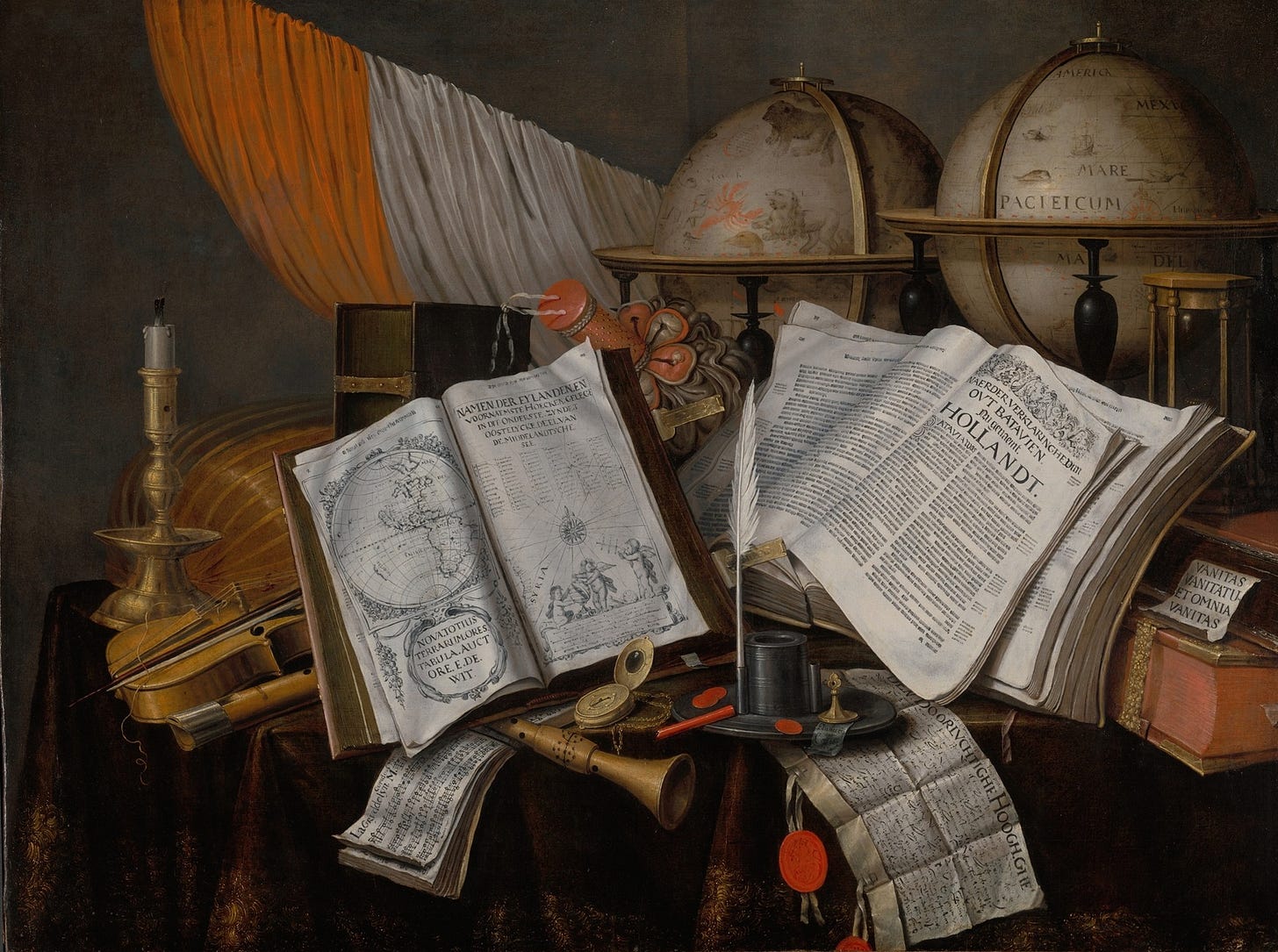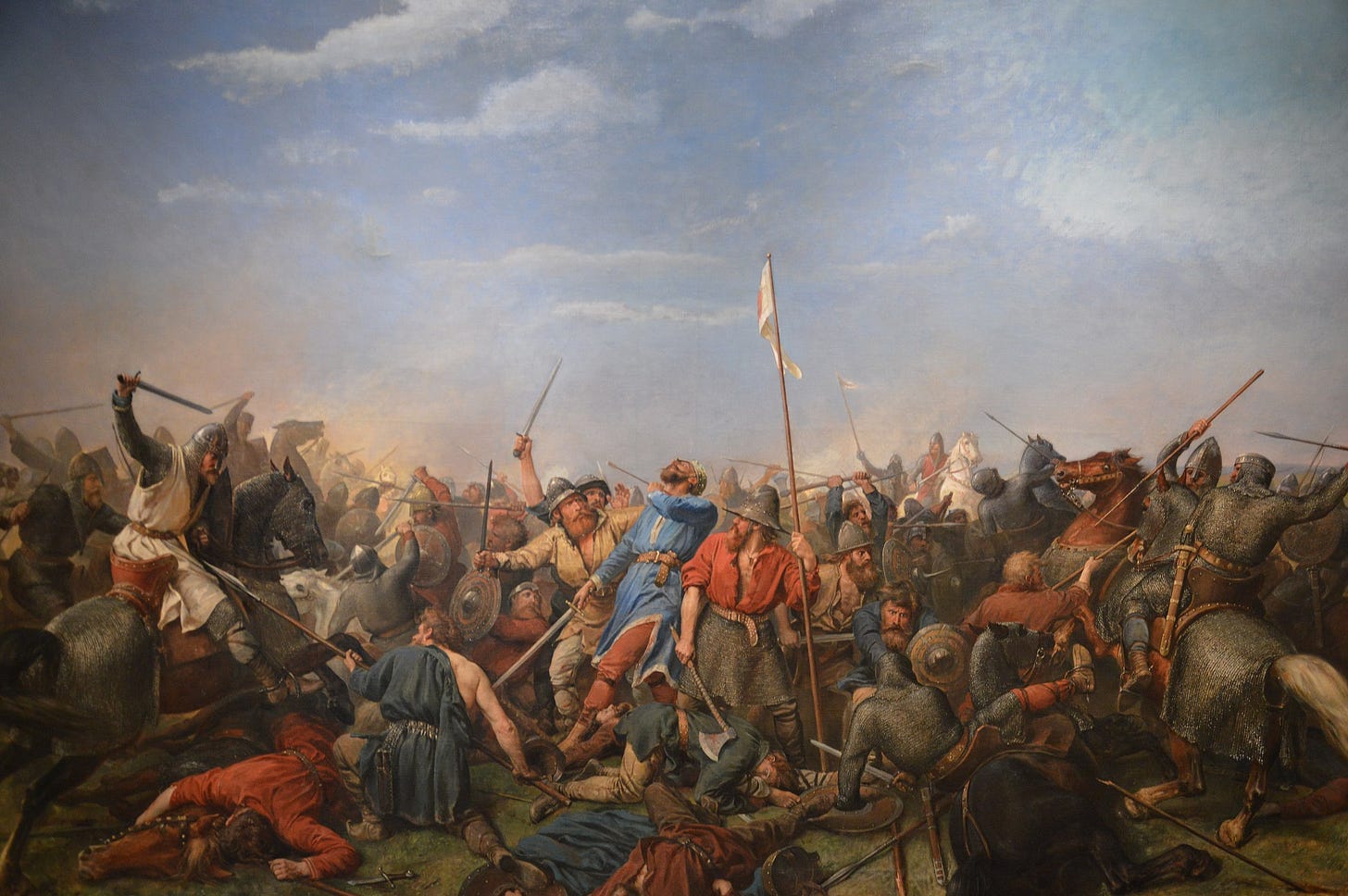How to get started with Old English poetry
Five poems to read that aren’t Beowulf
Most people who know anything at all about Old English poetry will be aware of the existence of Beowulf. Perhaps they will even have read it.1 But far fewer will be aware of the 90% of Old English poetry that is not Beowulf.
It’s a shame, because the back catalogue of Old English poetry — the deep cuts — are well worth reading. And, in general, these poems are much easier (and shorter) to read than Beowulf.
The entire corpus of surviving poetry written in Old English stretches to about 30,000 lines; around 3000 of which make up the single poem Beowulf. But the rest, written somewhere between AD 700 and 1066, is divided among many shorter poems, mainly preserved in four manuscripts,2 none of which approaches the fame of Beowulf.
Ironically, despite its fame, Beowulf is probably the hardest poem to start with: it’s long and frequently obscure, requiring a mountain of commentary to explain all of the lore.3
Furthermore, scholars disagree on pretty much all the big topics about Beowulf. When it was written, where it was written, whether it was a product of oral tradition, whether it’s fundamentally Christian or pagan, how much we can trust the seemingly historical material in the poem… is all fiercely fought over. These controversies are worth exploring, in my opinion, but it’s sometimes nice to get started at the shallow end.
Although Beowulf is great heroic poetry, the Old English poetic corpus has a lot more to offer than just heroic poetry! It also contains elegiac poetry, which are meditations on the fleeting nature of life. It contains riddles as well, some of which are quite salacious. There are also wisdom poems, which provide the kind of timeless, well, wisdom that you also see in the Biblical books of Proverbs and Ecclesiastes or the Old Norse Hávamál. Finally, there are religious poems, which transpose Christian themes into the Germanic worldview.
In each of these genres, there are works that rise to the level of great art that has stood the test of time. They’re just sadly not so well-known today. And I think that’s a shame, because they’re full of surprises: talking objects, epic battlefield speeches, and poetic imagery you’ll find nowhere else in English literature.
I’d like to introduce you to five of them here, one in each genre, each of which you could read in translation in a single sitting. I’ll give you a taste of each poem, why I think it’s special, and how you can read it right now.
You're reading The Dead Language Society. I'm Colin Gorrie, linguist, ancient language teacher, and your guide through the history of the English language and its relatives.
Subscribe for a free issue every Wednesday, or upgrade to support my mission of bringing historical linguistics out of the ivory tower and receive two extra Saturday deep-dives per month.
You’ll also be able to join the very first Dead Language Society summer book club(!), where we’ll be reading Beowulf together. We’ll compare translations against the original Old English and explore the historical and cultural context of the poem. Along the way, I’ll explain all the deep lore that most readers miss.
Our first meeting will take place tomorrow, Thursday, July 3, at 3:30pm Eastern.
Heroic: The Battle of Maldon
The Battle of Maldon is a near-contemporary account of a battle which took place in AD 991 between the English and Danes (that is, Vikings) near Maldon, a town in Essex.4
The leader of the English army was a nobleman named Byrhtnoth. The battle was a defeat for the English: Byrhtnoth was killed and, as a result of the loss, the English king Ethelred was obliged to pay tribute to the Danes.
This tribute was the so-called Danegeld, a word still used today for what happens when you pay an extortionist: they come back for more. Or, as Kipling put it, “once you have paid him the Danegeld // You never get rid of the Dane.”5
The Battle of Maldon as we have it today is a fragment: we have 325 lines of what must once have been a longer poem. But those 325 lines are filled with great speeches, heroic deaths, and battle scenes that feel like they came out of an action movie, such as this excerpt:
Ravens circled, screeching for corpses—
The eagle was ravenous for a feast of flesh—
All earth was in endless uproar.
Warriors thrust file-hardened spears
From their hands, grim shafts at guts—
Bows were busy, shields shot with arrows—
Bitter was the battle-rush. Warriors fell
On both sides—youngbloods lay dead. (108–115, Williamson)
The poem presents Byrhtnoth’s death as a heroic last stand against overwhelming odds. Fans of Lord of the Rings will find the overall feeling of the poem familiar — indeed, Tolkien was deeply influenced by The Battle of Maldon.6
Here are probably the most famous lines from the poem. They’re part of a speech that occurs near the end, where one of Byrhtnoth’s retainers tries to rally the men after their lord’s death:
The spirit must be stronger, the heart fiercer,
The courage keener, as our strength slips away. (316–317, Williamson)
If you want to read this poem, and all of the poems I’m showing you today, I recommend two translations: one freely available online and one you can buy in book form. The free, online translation is by Ophelia Hostetter and is available here.7 If you’d like to buy a more traditionally published translation, try Craig Williamson’s The Complete Old English Poems, which is the translation I quoted above.
Elegiac: The Wanderer
The genre of elegiac poetry may need a few words of explanation.
These poems are meditations on loss, exile, and the fleeting nature of human existence. My favourite is The Wanderer, which is the reminiscences of an exile condemned to wander the earth, deprived of the lord he once served.
It’s full of amazing imagery, but the most famous passage is this one, where the narrator asks where the various good things he used to know have gone:
Where has the horse gone? Where is the rider? Where is the giver of gifts?
Where is the seat of feasting? Where is the hall-joy?
Gone is the bright cup. Gone is the mailed warrior.
Gone is the glory of the prince. How the time has slipped
Down under the night-helmet as if it never was. (Williamson, 97–102)
If this looks familiar to you, it may be because Tolkien plundered it for The Lament for the Rohirrim, which appears in The Two Towers:
Where now the horse and the rider? Where is the horn that was blowing?
Where is the helm and the hauberk, and the bright hair flowing?
Where is the hand on the harpstring, and the red fire glowing?
Where is the spring and the harvest and the tall corn growing?
One interesting difference between Tolkien’s poem and its inspiration is that Tolkien’s version uses rhyme, which Old English poetry (even in the original) very rarely does. Instead, Old English poetry works based on alliteration: the matching of sounds at the beginning of words.
It’s harder to see the effect of alliteration in translation, since many of the Old English words have to be replaced when we try to express their meaning in Modern English. But some translators try to recreate it as much as possible, as Williamson does with Where is the giver of gifts? and Gone is the glory.
Read The Wanderer in Hostetter’s translation here, or find it in the Williamson anthology.
Riddling: Exeter Book Riddles

The Exeter Book is one of the four surviving manuscripts which give us most of the Old English poetry we have. In addition to The Wanderer, which we just discussed, Deor, which we’ll talk about shortly, and many other poems, the Exeter Book contains more than 90 riddles written in verse.
These riddles often involve objects speaking, and challenging us to “say what I am”:
I am man’s treasure, taken from the woods,
Cliff-sides, hill-slopes, valleys, downs;
By day wings bear me in the buzzing air,
Slip me under a sheltering roof—sweet craft.
Soon a man bears me to a tub. Bathed,
I am binder and scourge of men, bring down
The young, ravage the old, sap strength. (Williamson, Riddle 25,8 1–7)
In this case, the answer is probably mead: it starts out as nectar, found in the “woods” and “valleys,” is borne by bees (“wings” in the “buzzing air”), taken to a “tub” where the fermentation occurs. After fermentation, mead becomes able to “bring down the young” and “ravage the old” when they drink it.
Not all of the other riddles have such clear answers, but it’s great fun to try your hand at working them out for yourself. If you’d like to read more about the Exeter Book Riddles, I wrote up a longer discussion of them here.
You can read the full collection translated by Hostetter here; they also appear in Williamson’s collection.9
Religious: Dream of the Rood
The Dream of the Rood is a poem about the crucifixion of Jesus told from the perspective of the cross (rood is an archaic word for cross; related to rod). It takes place within a dream, in which the dreamer meets the cross on which Jesus was crucified. The cross then speaks:
“Many years ago—I still remember the day—
I was cut down at the edge of the forest,
Severed from my trunk, removed from my roots.
Strong enemies seized me, shaped me into a spectacle,
Ordered me to lift their outlaws, crucify their criminals.
Men bore me on their shoulders, set me on a hill,
Fastened their foes on me, enough of enemies.
Then I saw the Lord of mankind hasten to me,
Eager to climb up. I dared not bow down
Against God’s word. I saw the earth tremble—
I might have slaughtered his foes, yet I stood fast. (Williamson, 31–41)
In some places, The Dream of the Rood is like a riddle poem. See how the cross describes itself: here the talking object motif is transformed from a curiosity or a brain-teaser into something much more potent.
The Dream of the Rood is also interesting in how it reconceives Jesus as a kind of Germanic hero, using the same language to describe him as the warriors of a heroic poem like Beowulf or the Battle of Maldon:
The warrior, our young Savior, stripped himself
Before the battle with a keen heart and firm purpose,
Climbed up on the cross, the tree of shame,
Bold in the eyes of many, to redeem mankind. (Williamson, 42–45)
Even the action of stripping before battle comes from heroic poetry: it’s exactly what Beowulf does before his fight with Grendel.
It’s something of an inversion of the typical scene we see in poetry, where the hero arms himself for battle, as Achilles does in the Iliad. In Beowulf, however, the hero removes his armour before battle, rather than putting it on: Beowulf is so strong that he will face Grendel without armour or weapons — beyond his hands, that is.
The only other hero who disarms before his great fight is the Saviour of The Dream of the Rood. Coincidence? I think not.
You can read the whole 160-line poem in Williamson or in Hostetter’s free translation.
Wisdom: Deor
Deor is another poem found in the Exeter Book. But it’s an especially short one: just over 40 lines.
The poet first describes a succession of events and characters from Germanic legend, such as Weland the legendary smith, and Eormanric, King of the Goths. From the woes that these characters experienced, the poet encourages us to take a moral lesson: this too shall pass.
Deor is unlike other Old English poems in its structure: like much later English poetry, it’s divided into stanzas, and contains a refrain. And what a refrain it is.
Here’s the last stanza, when the poet moves from the figures of legend to his own fate, to which he applies the lesson he has drawn from history. At the end comes the refrain (in bold italics):
Let me tell this story about myself:
I was singer and shaper for the Heodenings,
Dear to my lord. My name was Deor.
For many years I was harper in the hall,
Honored by the king, until Heorrenda now,
A song-skilled shaper, has taken my place,
Reaping the rewards, the titled lands,
That the guardian of men once gave me.That passed over—so can this. (Williamson, 34–42)
That last line is the kind of thing people get tattooed on their arm.
Like the other poems, you can read Deor in Williamson’s printed volume or Hostetter’s translation online.
Despite its age, Old English poetry often feels fresh and new when we read it now.
Part of the reason for this is that most English poetry from the later Middle Ages onwards took its models not from the Old English poetic tradition, but from the traditions of Continental Europe, especially France and Italy. This is where we get rhyming, sonnets, and iambic pentameter from.
Old English poetry is something different altogether. As a result, it has a freshness and vitality that even comes through in translation.
As you read more of it, it paints a picture of a world that I at least can’t help but find compelling: one where exiles roam the ice-cold sea alone, where heroic generals make courageous last stands, and where the world of everyday objects becomes somehow enchanted.
And, as you’ve seen here, it’s more accessible than you might think: go read it for yourself!
They’ve most likely read the Heaney translation. I wish they'd choose a different one.
They’re preserved in four codices, technically. A codex is a type of manuscript composed of a stack of pages bound at one end. Technically, books in the modern format (e.g., paperbacks and hardcovers) are all codices, although we usually don’t call them that.
If you’d like to join me in demystifying this lore, we’re running a Beowulf Book Club, and it’s starting tomorrow, July 3. Check out the little section in italics at the end of the intro if you’d like to join us!
Today, Maldon is probably more famous for its sea salt.
Dane-geld, 16–17.
In fact, J. R. R. Tolkien also wrote a prose translation (along with some Battle of Maldon fan-fiction), which has been published as The Battle of Maldon, together with The Homecoming of Beorhtnoth.
For those who care about such things, Hostetter’s translation often veers to the casual (e.g. “Those guys”), while Williamson’s strikes me as more neutral in its register.
Riddle 27, according to most other editions.
Take care if you’re comparing the two translations: Williamson numbers the riddles differently from everyone else.





Speaking of words worthy of a tattoo:
ne mæg weorðan wis wer ær he age wintra dæl in woruldrice
I fondly remember reading The Battle of Maldon in a university class—our professor was passionate about heroic poetry—but The Wanderer’s quiet sorrow speaks to me more personally. The loneliness of its voice is something that I've been trying to echo in my own writing—more than 1,000 years later :)